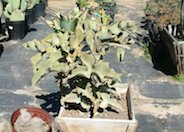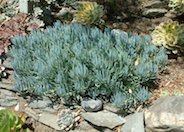
Common name:Strawberry Madrone
Botanical name:Arbutus 'Marina'
The 'Marina' has gorgeous bark, with leaves that are smaller and not as glossy as Pacific Madrone. Its flowers are pink, borne in pendant clusters in the summer. The fruit is large, red and quite ornamental. The plant should be grown in sun to part shade, with little or no summer watering when established. The 'Marina' prefers good drainage. -Monterey Bay Nursery

Common name:Felt Plant or Bush, Velvetleaf
Botanical name:Kalanchoe beharensis
This unusual succulent perennial will grow 4'-5' tall and wide. It has thick, fuzzy, gray green to golden leaves with inconspicuous flowers. Although tender to frost, it makes an excellent accent for rock gardens or desert themed landscapes.

Common name:Fox Tail Agave, Velvet Agave
Botanical name:Agave attenuata
This Agave has a dramatic tropical form. Even light frost can damage its succulent leaves. It is great for containers. In the low desert, partial sun will be best. If it becomes top heavy, simply cut and stick in the ground to root. It is not a fast grower and has light green foliage. It will also die after flowering but pups around the mother will survive. Distinctive with its large rosette of leaves perched on a long curving trunk, it is a native from Mexico.

Common name:Kleinia
Botanical name:Senecio mandraliscae
This succulent perennial will grow to about 1.5' tall and 2' wide. It has curved, bluish gray leaves that are about 3.5" long and very slender.

Common name:Australian Willow, Wilga
Botanical name:Geijera parviflora
This evergreen tree reaches a height of 25', with 3"-6" long, medium length, green colored leaves that are narrow. Its main branches sweep up and out, while the smaller branches tend to hang down.

Common name:Scarlet Trumpet Vine
Botanical name:Distictis buccinatoria
This evergreen vine is highlighted by large, blood red, trumpet-shaped flowers with a yellow throat. These flowers will continue to appear throughout the warm months.
Designer: Sunset Staff
Photographer: GardenSoft
Incorporate compost 6" into your soil to retain water, reduce compaction, feed earthworms, and provide valuable nutrients to your plants.
Remove irrigation water and fertilizer from areas where you don't want weeds to grow.